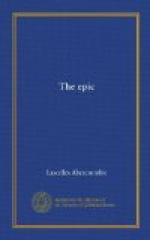FOOTNOTES:
[Footnote 13: In the greatest poetry, all the elements of human nature are burning in a single flame. The artifice of criticism is to detect what peculiar radiance each element contributes to the whole light; but this no more affects the singleness of the compounded energy in poetry than the spectroscopic examination of fire affects the single nature of actual flame. For the purposes of this book, it has been necessary to look chiefly at the contribution of intellect to epic poetry; for it is in that contribution that the development of poetry, so far as there is any development at all, really consists. This being so, it might be thought that Keats could hardly have done anything for the real progress of epic. But Keats’s apparent (it is only apparent) rejection of intellect in his poetry was the result of youthful theory; his letters show that, in fact, intellect was a thing unusually vigorous in his nature. If the Keats of the letters be added to the Keats of the poems, a personality appears that seems more likely than any of his contemporaries, or than anyone who has come after him, for the work of carrying Miltonic epic forward without forsaking Miltonic form.]
[Footnote 14: For all I know, Hugo may never have read Milton; judging by some silly remarks of his, I should hope not. But Hugo could feel the things in the spirit of man that Milton felt; not only because they were still there, but because the secret influence of Milton has intensified the consciousness of them in thousands who think they know nothing of Paradise Lost. Modern literary history will not be properly understood until it is realized that Milton is one of the dominating minds of Europe, whether Europe know it or not. There are scarcely half a dozen figures that can be compared with Milton for irresistible influence—quite apart from his unapproachable supremacy in the technique of poetry. When Addison remarked that Paradise Lost is universally and perpetually interesting, he said what is not to be questioned; though he did not perceive the real reason for his assertion. Darwin no more injured the significance of Paradise Lost than air-planes have injured Homer.]



